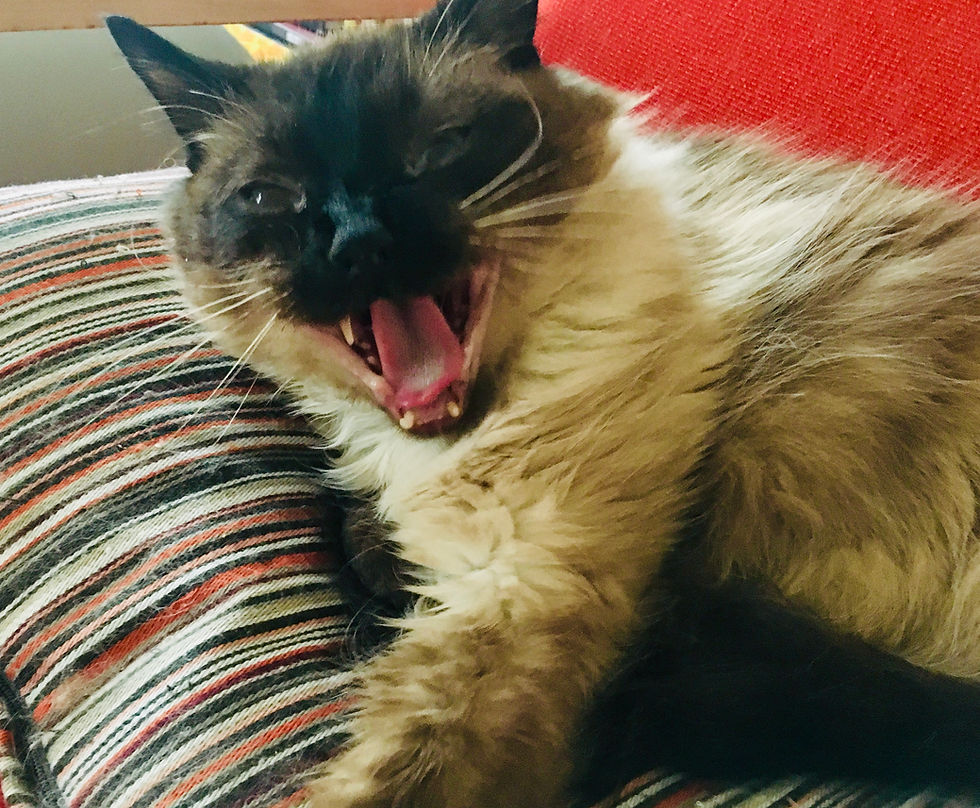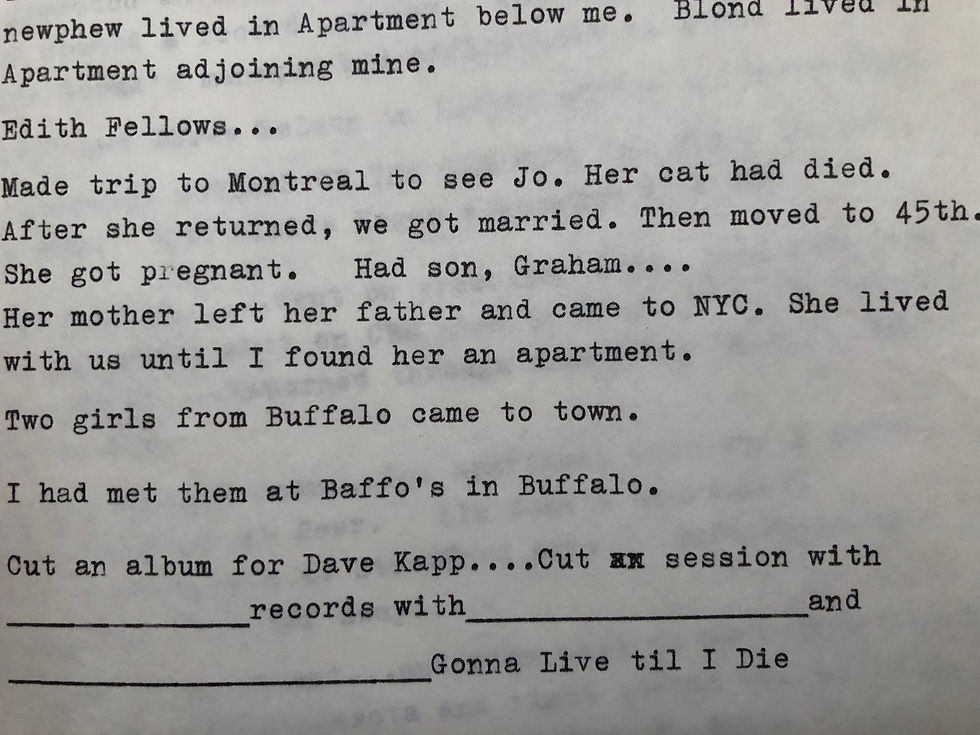Part 29: The Cat and The Ashes
- Stacya Shepard Silverman

- Jun 14, 2020
- 7 min read
Updated: Feb 9, 2024
Last week, I read over my half-sister's full story for the first time. I knew bits and pieces, but not all of it. All week, I haven't been able to stop thinking about what happened to her mother's cat. Jo left town to do a play for a few weeks in Canada, and she asked Riley, who was living at her apartment, to take care of her cat while she was gone. Next thing she knew, Riley said her that her cat had died.
*The role of Jo's cat in this blog will be played by Sarah Harlett's cat, Alfie... Alfie is a member of SAG/AFTRA and Equity. Photo rights of Alfie's image (below) strictly enforced.

Years later, when Leslie was a teenager, Jo told Leslie that Riley had never liked the cat, and she always suspected that he got rid it.
Why am I so hung up on this? After all, abandoning your children and conning people is much worse than getting rid of your girlfriend's cat, right? Or…what happened to that poor cat?
When I first got a hold of my father's journal, pages were all in a strange order. The page I photographed below was mixed in with other pages from the late 1950s, where he writes about signing the song "Pretty Girl" to Duchess, and he began a company under his pen name, Dickson Hall, LTD. Prior he recorded "And God Said" with Dana Andrews for Epic, and he wrote a song called "Just Wearing Out Your Shoes" using the pen name Paul Lester. He writes about Larry Kay and a Huge Downs album.
He mentions some life events, a blonde that lived in the apartment adjoining his, and other people and possible girlfriends, (Edith Fellows), and that he made a trip to Montreal to see Jo. He wrote, "Her cat had died." Did he go to tell her in person? Not knowing Leslie's story, this entry jumped out at me at the time. Now, knowing the story (I didn't tell her about this part of the journal) there's something that worries me.

I have memories of my parents taking care of animals. Or was it just my mother? We had our first pet in Hollywood, a beautiful long hair Siamese kitten. The kitten was brought home to our apartment on Selma and Cassil Streets, and stayed with us until Porterville, California, dozens of moves later. Looked a bit like Alfie, above.
I visited the corner apartment building again with my husband four years ago. Since my father's passing in 2009, I had struggled with what to do with my father's ashes. There was no family home to bury them, we'd moved so many times.
I thought it would be funny (in a twisted way) to put Dad's ashes in places where we'd been evicted, including the Selma/Cassil Street place. We lived in the apartment with the cat from around 1967 to 1971, longer than anywhere else.
I sprinkled the ashes by a tree on the median strip, and my friend Steve sang "King of the Road" to commemorate the event. Here's the video David made of me and Steve: I removed this because of copyright concerns. No more video.
© copyright 2019-2022 Stacya Silverman. All rights reserved.
After the "King of the Road" memorial, we joined up with a friend from Seattle, Sheila. Over lunch she told us that she'd begun a blog about sociopaths. I asked her what had inspired her to start a blog about sociopaths? She told us that she had married the man of her dreams, but he went on to ruin her credit the first six months they were together. He eventually left her deeply in debt. She found out later he'd done the same to many other women, and she discovered that he had families in different countries. She decided to write about what she'd learned.
When I told her a little about my father, she was certain Riley was a sociopath. My husband defended my father, and I defended Dad, too. "But he felt bad about things he did," I said, adding “I thought sociopaths don't feel bad."
"Right, but sociopaths learn to do what they think will work, even apologizing. They only "seem" to feel bad. It's all an act," Shiela said.
It's deeply disturbing to think that a person in your life might've been a sociopath. I've been attached to the idea that Riley's childhood trauma caused his personality disorders, or even that early head injury. Remember earlier in the blog about WWll and I said I'd tell you what my mother told me years ago? She told me that Riley was rejected for service, although in perfect physical health, because he'd been diagnosed as a sociopath. So it wasn't the first time I'd heard the idea about Riley, I just don't think it's true.
When I think of that word, sociopath, I think of people who are cold-blooded, violent and cruel, even to animals. But perhaps there's a spectrum? Dad wasn't violent, as I've mentioned. He never said he disliked cats, not to me anyway. My mother saved animals---birds that had fallen out of nests were cared for and set free, she almost had her eye pecked out by a pelican she was trying to rescue, and that same year she crawled into a manhole to rescue kittens that someone had thrown into the gutter. I guess I thought because my parents were together that they felt the same way about creatures. Now, I don't know.
This is a microcosm of what goes on inside my brain, finding out all this information, even the story of Jo's cat. It challenges my perceptions of the past. I only know that when Sheila suggested Riley was a sociopath, it was unsettling. I became defensive. I can list so many things that make me think he wasn't, including the regrets he lists in his journal. At the time of my conversation with Sheila I knew what Riley told my mother, that he wasn't accepted in the United States Army, because, according to my mother, he was diagnosed as a sociopath.
Back when I was eleven, we ended up owning a slingshot. I'm not sure where it came from, perhaps a friend had left it at our house, and it went unused. We weren't big on BB guns and slingshots and such. One day, Dad came inside, extremely pleased with himself. He began to brag to us, (me, my mother, and my older sister, Lisa) about how he aimed the slingshot at a bird in a tree and killed it on the first try. He did not get the reaction he was after.
We berated him, "Dad, how could you?" and "Why dad? What about the nest?" All of us piled on him, shouting at him that perhaps he'd killed a mother and now all the babies would starve, and what kind of a person kills birds for fun?
Riley was beaten down, and appeared to feel bad. In my memory, he felt remorse.
I've always believed that people who are cruel to animals are probably beyond repair. In the news recently, a white woman had her dog off leash in Central Park in New York, and a black man who was bird watching asked her politely to put her dog on a lead. She began to argue with him, and she threatened to call the police on him. Which was odd, because she was the one breaking the law, he was respectfully asking her to leash her animal. There was even a sign in the park saying dogs must be leashed. Anyway, she became so belligerent that he decided to film her with his camera phone. She yelled she would call the police, and "tell them that there's an African American man threatening my life."
Disturbing on so many levels.
Something else happened with that woman. The video of the woman went viral. She did put her dog on a leash, and roughly kept the dog tight and close, almost choking the poor creature. People expressed outrage at the treatment of the dog. The shelter saw the video and took the dog back. All these events became big news. Some said that people cared more about the dog than the man. I contend that it isn't a "either you care about her dog, or you care about the person" argument. I believe that people who are cruel to animals are capable of anything. It's a sign. Her behavior towards Mr. Cooper was unhinged, backed up by her treatment of the dog.
So the cat story has been on my mind this week. It creeps me out thinking that Riley "got rid" of his girlfriend's cat.
*
This strange thing happened with Dad's ashes. In September, 2015, David and I went to an apartment building, or what I thought would be an apartment building, at 1910 West Burnside in Portland, Oregon. That is where we lived right after I was born, and we'd been evicted, so I thought I'd put some of Dad's ashes there, too.
When I arrived at the address in Portland, the apartment building had been torn down, but there was a park across the street. The park was tiny, it was a fire fighter's memorial. I decided to put some of my dad's ashes there.
I stood by a tree and opened a glass vial of Riley's cremains. I tipped the vial, and the ashes plummeting down, heavier than I thought they'd be, like gravel. When I looked at the shape the pile had taken, I said to David, "hey, does that look like a cat's head to you?"
"yeah, kind of does. Take a picture," he said.
So I did.
Maybe Jo's cat was playing a prank.

Here's a long quote regarding the impact lies have on communities and cultures rather than individuals. It's from an article Anne Applebaum wrote recently for The Atlantic:
"The lie was petty, even ridiculous; that was partly why it was so dangerous. In the 1950s, when an insect known as the Colorado potato beetle appeared in Eastern European potato fields, Soviet-backed governments in the region triumphantly claimed that it had been dropped from the sky by American pilots, as a deliberate form of biological sabotage. Posters featuring vicious red-white-and-blue beetles went up all across Poland, East Germany, and Czechoslovakia. No one really believed the charge, including the people making it, as archives have subsequently shown. But that didn’t matter. The point of the posters was not to convince people of a falsehood. The point was to demonstrate the party’s power to proclaim and promulgate a falsehood. Sometimes the point isn’t to make people believe a lie—it’s to make people fear the liar".---Anne Applebaum from a story for The Atlantic.
*
It's strange not knowing what the truth is, even if it seems at first glance that the lie is minor. This event that happened so long ago may seem like nothing compared to the other things that Riley did, but it makes sense that if a person has no attachment to some of their own children, they'd make a shitty cat-sitter.
*
Next, blog number 30: Did Riley have an affair with Marilyn Monroe when she was still an unknown model?
© copyright 2019-2022 Stacya Silverman. All rights reserved.



























Comments